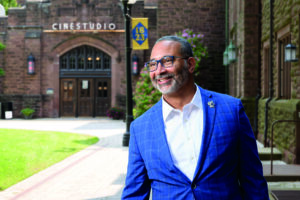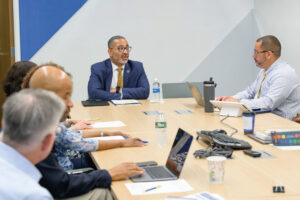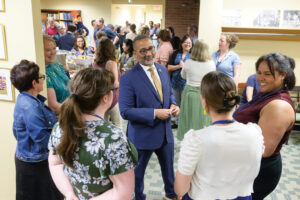Dan Lugo
Getting acquainted with Trinity’s 23rd president
Interview by Sonya Storch Adams
Photos by Nick Caito
Dan Lugo, Trinity College’s 23rd president, sees a clear difference between Trinity and other liberal arts colleges.
“There’s how they do the liberal arts, and then there’s how Trinity does the liberal arts,” he says. “Our curriculum takes ownership of not just what happens on campus in our classrooms but also what you apply it to in the real world. I think our alumni network and our connections to industry, nonprofit, and civic leadership are exceptional. And I can’t talk about the distinctiveness of Trinity without noting the strength of our faculty. It’s hard to find another institution that has a faculty as productive in scholarship and knowledge creation as what we have here.”
Trinity’s unparalleled liberal arts education was just one of many topics that Lugo, who officially started at the College on July 1, 2025, discussed during an interview that took place just days after he assumed his new role. Read on for more.
Why Trinity? 
So much excites me about Trinity and has for a long time. It starts with our academic excellence, which most recently was refreshed by the Trinity Plus curriculum, our hands-on approach to the liberal arts. I also was drawn to the vast number of successful alumni in an array of fields. I’ve already learned how passionate they are about Trinity and connecting our students and graduates to opportunities. The more I learned about our faculty, the more impressed I became. Our faculty are remarkable in their disciplines, and they are exceptional at bringing our students into that experience. Then we have our location. With the importance of connecting what students learn in the classroom to the real world, our place in Hartford—a vibrant civic, business, and cultural center—is a huge advantage. Our proximity to New York and Boston and the transportation advantages we have with Amtrak and the airport in our backyard provide even more advantages. And our campus is inspiring—the historical nature and the grandeur of it.
What do you consider your highest priorities as you embark on your presidency?
I am accelerating my learning about Trinity, its culture, its operations, its curriculum, and its place in American and global higher education and doing that at a pace that is thorough and that gets me to the point where I can make thoughtful suggestions about future priorities and potential areas for new investment. This will require quite a bit of strategic listening and invitations to our faculty, staff, alumni, and students for them to share insights about what makes this place distinctive and what they think are the ripest opportunities for us to strengthen our community. I want to gain a better understanding of our enrollment and financial models, a place where I believe I can add immediate value. And we are building a new leadership team. We have wonderful folks carrying over from the previous administration, and I’m excited to have that continuity, but as of July 1, we became a new team with a few new folks. I hope to create a culture of true shared ownership of this important college.
What do you see as the value of a liberal arts education?
People sometimes think of the liberal arts as isolated disciplines. They might ask, “What can you do with an English major?” Well, an English major can do amazing things, and especially an English major from Trinity, because through the liberal arts—the way we do it at Trinity—students are exposed to so many different disciplines as they specialize in English. I think time will demonstrate that graduates of institutions like Trinity will have the best chance of adapting to a future highly impacted by AI, robotics, and computation theory. Our graduates will find agile ways to stay relevant.

What challenges do you see for Trinity?
I don’t see Trinity as having challenges that are different from those of other higher ed institutions. These include a changing and diminishing supply of high school students and an increasingly competitive landscape for those students. There are economic challenges; we don’t have tremendous income growth nationally, yet we have escalating costs that largely center on the way we provide a competitive and immersive education. Those cost structures don’t slow down—the costs of human capital, insurance, the provision of room and board. They all escalate. How do we manage these in the most efficient and thoughtful ways that still allow us to deliver a first-class academic and student life experience? In addition, we are several years into a trend that I would call concerning. These newer challenges are on the political and public opinion front, where the media and many members of our government have been antagonistic to American higher ed. This exacerbates our challenges, and I think this is a moment of reckoning where we must pay more attention to demonstrating not only the quality of what we do but also the public good that we do. American higher education needs to band together to counter those narratives.
What are the most important ways alumni can help Trinity?
What comes to mind first is engagement with the College. We are thankful for the alumni who have stepped up in service through representative boards—such as the Board of Trustees and the Board of Fellows—and a wide range of areas. We need to create even more meaningful engagement opportunities for our alumni—to keep them informed about the College, to help them discover how their involvement can enrich their own lives, and, in turn, bring value to the lives of our faculty and students. We need our alumni now more than ever to be strong ambassadors for Trinity. We need to demonstrate to the world that Trinity is a leading institution, and alumni can be better ambassadors for Trinity than Trinity itself. Everyone knows that it’s in the interest of the faculty and staff to tout the College; it’s different when you hear from alumni who are passionate about their alma mater. Alumni also can plug our community into leads on internships and full-time employment. And, of course, there’s the always critically important method for our alumni to make an impact through their philanthropic investment in us—Trinity does so much to change and improve the world.
What do you see as Trinity’s role in Hartford, and vice versa?

I think Trinity’s role in Hartford is to be a partner with a capital P. We are an important contributor to the city’s economic development and cultural vitality. This is a partnership that’s entering its third century. In those 200-plus years, there’s likely been an ebb and flow, where Hartford was helpful to Trinity and Trinity was helpful to Hartford. That balance and back and forth is something that I look forward to continuing.
Who have been the most impactful mentors in your professional life?
I go back to my first role in higher education at Carleton College. Paul Thiboutot was the dean of admissions, and his mentorship allowed me to envision a transition out of a law career, to understand how I could positively impact an institution that I loved, and to learn about a new industry that I didn’t know a lot about other than having been the by-product of its experience. I also think of Dan Porterfield, who was my boss and the president of Franklin & Marshall College and is now CEO of the Aspen Institute. It was under his mentorship where I first started thinking about the possibility of being a college president. That wasn’t a childhood goal; it wasn’t even my goal when I got into higher ed 21 years ago. I had powerful opportunities to shadow a great leader and saw the way he talked the talk and walked the walk—the importance of understanding the student experience, finding ways to invest in that experience, how that paid dividends to the college. That was instrumental in how I think about my role as a college president. Finally, and most recently, David Greene, the president of Colby College, allowed me to have a front-row seat and to be an active partner in developing a strategic plan and creating an aspirational and exciting vision for a college.
Who have been the most impactful mentors in your personal life?
My parents—the original mentors—taught me the value and importance of hard work, humility, caring about people and society, giving back, not taking things for granted, and understanding one’s privilege even if you’re from modest backgrounds.
What’s the best advice anyone has ever given you?
I got this from David Greene early on. He encouraged me “to show my work process more often and invite people into my work.” I grew up as a very self-contained worker. I would bring in great results, but they kind of just hatched. That extended to my early work life as well. I had this not-always-helpful sense of making things look a little bit easier than they were. I didn’t show the sweat; I just got things done. It was transformative for me to think about allowing folks to see into my process, to take more ownership of things that we do collaboratively, and to not make things look so easy. This advice has made me a more inclusive leader.
What do you like to do when you’re not working?
I like to spend time with family; we’re tight-knit. That can be anything from sitting around catching up on movies to having conversations. I love to travel and look forward to representing the College and being a good ambassador for Trinity. I love to read; that’s an important part of me staying abreast of world developments and staying sane. It’s a part of my mindfulness. I think wellness is important, so my wife and I are thoughtful around what we do for our physical care by walking and working out. And I like having good friends. We’ve lived all over the country, so we have a friend group that includes folks from New York, Minnesota, Pennsylvania, Maine, and North Carolina.
You mentioned travel. What are some of your favorite destinations?
We love traveling to Japan. The immersive nature of the culture, the depth of the history, and the vibrancy of the major cities of Tokyo and Kyoto, as well as the public works (I am fascinated by the bullet train system). I’m a big fan of Asia; we love Singapore and Thailand, for distinct reasons. And we love Latin America and Mexico and, finally, any place that has a beach! I’m looking forward to getting to Italy and understanding Trinity’s presence in Rome.
What’s one tidbit about you that might surprise others?
I have a strong background in music. Growing up, I was a pretty serious string bass player. I also have a pretty passionate affinity for classical music. And I really love the performing arts.
A bit of background
Education:
B.A. in political science, Carleton College
J.D., University of Minnesota Law School
Key previous positions:
President, Queens University of Charlotte, 2019–25
Vice President of College Advancement, Colby College, 2015–19
Vice President and Dean of Admissions, Franklin & Marshall College, 2011–15
Associate Dean, Admissions Office; Development Officer, College Advancement, Carleton College, 2004–11
Intellectual Property and Entertainment Attorney, 1995–2004
Personal:
Wife, TinaMarie
Two adult children, Michael and Amanda
Lugo looks back
What was your favorite experience during college?
The Carleton Seminar in D.C., which was a full-term-long experience that included an internship and then a series of conversations with a wide range of civic thought leaders inside the Beltway, some media folks, some government folks, the vice president, senators, a whole wide range of people. That was an amazing experience to have the privilege of connecting with those on the cutting edge of what was happening in the late ’80s in D.C. and to have your pulse on American government and all the industries that were adjacent and ancillary to government. My internship was with the Honorable Charles B. Rangel, the congressperson from Harlem and chair of the House Ways and Means Committee, a real power broker in D.C.
Who was your favorite professor?
I would say the entire Political Science Department, which included Steven Schier, an American government expert; Paul Wellstone, former U.S. senator from Minnesota; and Roy Grow, an internationalist and international relations expert.
What were your favorite activities outside of class?
I got involved in the Carleton Players, which is the organization that puts on every semester’s major theater performance, and I had a couple roles there. I was a participant and sometimes a leader in the multicultural student organizations on campus. The ethnic diversity at Carleton was very, very small in the late ’80s, so that was important to me. My first couple years, orchestra was an important part of my participation and engagement.
What are a few favorite memories of your college years?
I vividly remember the night before and the morning of Commencement. It was almost novel worthy: friends and that penultimate moment when we ended up on the Cannon River (which flows through Northfield, Minnesota) watching the sunrise. The D.C. Seminar, which I already mentioned, was really memorable. And my first day of winter term 1988, when Minnesota was having normal Minnesota weather, and it was 15 or 20 below zero. I realized that I wasn’t going to die being out there and saw just how unbelievably beautiful it was.
What were the most important lessons—academic or otherwise—that you learned?
First, always be open to trying new things and to meeting new people. That strategic approach allows for a lot of serendipity and benefit to happen. Second, recognize the importance of consistent hard work, which took a long time for me to learn. I was more of an “episodic” hard worker at the outset. With consistent hard work, you get the benefit not only of better results but also of better learning. The episodic approach is actually harder, but you don’t realize that when you’re in it. It’s that old saying: “How do you eat an elephant? One bite at a time.” And college is kind of an elephant, so consistently taking a bite every day and creating those habits is critically important. Third, maximize and take advantage of your surroundings. That could be all the different structures on your campus and the unbelievable programming and events that happen at a place like Trinity and taking advantage of them.
What tips would you give today’s Trinity students?
Show up and be engaged. Comfort is nice, but if that’s all you’re getting from college, you’re not getting the full experience. Challenge yourself. Find ways to try new things. Be a consistent worker. And never, ever be afraid to ask questions. Always be inquisitive. Always seek answers. Take advantage of your adjacency to brilliant scholars and leaders on this campus.
